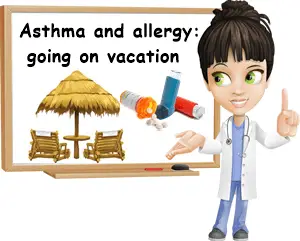Going on vacation when you have asthma and allergies requires careful planing. Choosing the safest vacation destination for asthma and your type of allergy and keeping them under control during travel, throughout and after the vacation are possible as long as you take control of your travel plans. Every aspect of your holiday plans deserves just consideration because going on vacation with asthma and allergies and enjoying a good time on your holiday is in the details.
Asthma and allergies are two respiratory inflammatory conditions you can live with your entire life. The important thing is to know how to control them and avoid the trigger factors. Controlling your asthma and allergies is easier when you are in a familiar environment because it means you know your way about, have a certain degree of control over the triggering factors of your conditions and can ask for help in case of an episode. Unfamiliar surroundings make it difficult to have control over what might trigger your asthma and allergies, hence the reason it is important to plan your vacation thoroughly.

How to go on vacation with asthma and allergies. Going on vacation means new surroundings, new people, different climate, water, food and plant life with maybe different varieties of pollen or molds etc. Every new aspect of life can be a potential trigger for asthma and allergy. And a vacation destination puts you in the position of having to change the environment you are used to, food, water, weather conditions and many more aspects of everyday life. In order to avoid an asthma attack or allergy episode while on vacation, afterwards, whilst traveling from one place to another or the conditions worsening after the vacation, here are 7 clever vacation advice for asthma and allergy:
1) Know your condition. Every condition is unique in its own way. It’s up to you to pay attention to what may trigger your asthma or allergies and learn to avoid said triggers. For example, asthma can be caused by thermal shock, meaning a rapid change in body temperature. This can occur when you jump into the cold ocean water for a swim after sitting in the sun for several hours and can cause a serious asthma attack. Knowing this can help you avoid an episode by gradually getting used to the cold water, avoiding it altogether after sitting in the sun or choosing a holiday destination with entertaining activities other than swimming.
2) Have you medication with you all the time. This goes without saying, but it is crucial that you have all of your medication with you at all times. Take your medicines with you when traveling, visiting, eating etc. Don’t leave them in the car, at the hotel or with luggage. Get a travel hand bag and take them with you everywhere. Remember that most medicines are heat-sensitive, so don’t leave them in the sun because heat can alter their efficacy.

3) Get backup medication. Ask your doctor to provide you with backup medication for your vacation in case you lose your medicines, misplace them, spill them, forget them in the sun etc. You shouldn’t even use it, but it’s good to have it with you.
4) Carry your medical papers with you. When you’re going on vacation with sensitive conditions such as asthma or allergies, it is important to have your medical papers with you. Have your doctor’s letters, health insurance card, medical identification bracelet, prescriptions, medicine bottles with labels with you. Also, your doctor’s contact information can prove useful.
5) Tell your doctor. When you go on vacation, there are certain people that need to know about your condition. First of all, your doctor should be informed, especially since he or she will provide you with your essential medication and medical papers for the trip. More importantly, your doctor can give you important advice to help you enjoy a great vacation with asthma and allergies.
6) Make your condition known. It’s not only your doctor that should know about your asthma and allergies. Hotel staff should be informed about your asthma or allergies so they can provide the necessary accommodations for the duration of your stay. Maybe they can make sure there is no mold in your room, change the air conditioning filter before you check in, provide a non-smoking room, a dust-free room or an asthma and allergy friendly pillow.
When you go out to eat, tell your waiter, the chef cooking the food about your allergies. Ask to be seated in the non-smoking section of the restaurant. If your child goes to camp or on a field trip with the class, make sure the teachers are well informed about the child’s condition, maybe have backup medication and know what to do in case of an emergency.
7) Don’t take risks. Plan your vacation ahead of time. Choose an asthma and allergy-friendly vacation destination. Have your essential medication with you all the time. Have backup medication. Avoid going to remote areas where there is no access to a medical facility. Maybe get health insurance for the duration of the trip. Have water with you at all times and stay hydrated (when you get a dry mouth and throat, allergies and asthma may act up). Avoid dust, pollen, cigarette smoke and other triggers. Stay inside if it’s extremely windy and the air is too dry.
Practice good hygiene by washing hands, eating food that has been cooked thoroughly, avoiding local water and drinking bottled water instead etc. Local water can carry bacteria or parasites and can cause gastroenteritis with upsetting symptoms such as diarrhea, dehydration, stomach sickness, vomiting that can encourage asthma and allergy episodes through dehydration, acid reflux etc. And remember that fruits and vegetables are washed with local water, hence the importance to enjoy cooked food, especially if your vacation destination is more exotic.
